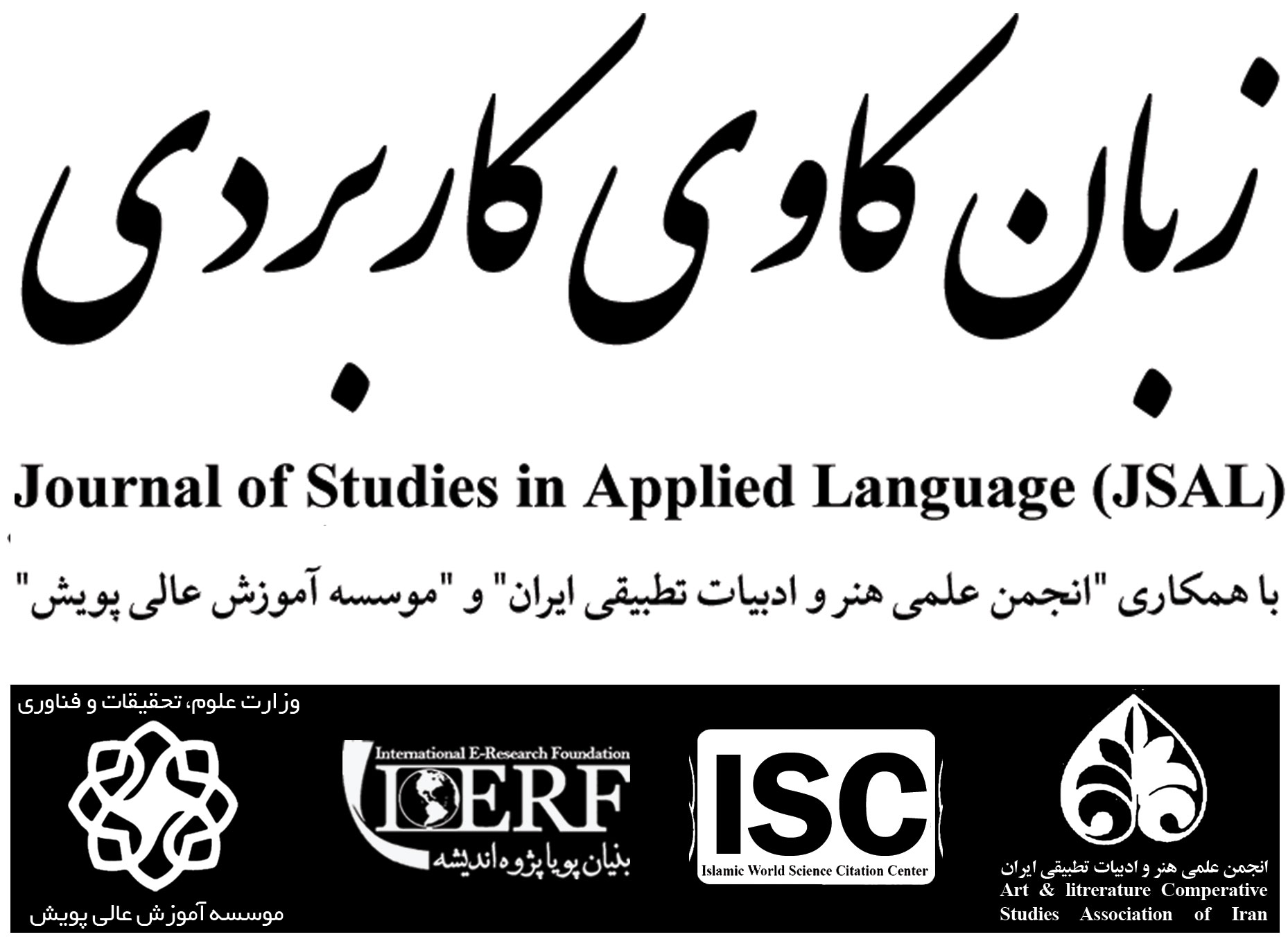<>
Volume 7, Issue 2 (5-2024)
JSAL 2024, 7(2): 113-137 |
Back to browse issues page
Download citation:
BibTeX | RIS | EndNote | Medlars | ProCite | Reference Manager | RefWorks
Send citation to:



BibTeX | RIS | EndNote | Medlars | ProCite | Reference Manager | RefWorks
Send citation to:
Khosravi N, Iraji M, Modarresi B. (2024). Investigation of cognitive phonology in learning English language and improving pronounciation in eliminating vowel errors of persian speakers [In Persian]. JSAL. 7(2), 113-137.
URL: http://jsal.ierf.ir/article-1-131-en.html
URL: http://jsal.ierf.ir/article-1-131-en.html
1- PhD student in Linguistics, Central Tehran Azad University, Tehran, Iran , nahid.khosravi6161@gmail.com
2- Assistant Professor, Department of Linguistics, Faculty of Foreign Languages, Central Tehran Azad University, Tehran, Iran
2- Assistant Professor, Department of Linguistics, Faculty of Foreign Languages, Central Tehran Azad University, Tehran, Iran
Abstract: (2254 Views)
Pronunciation, a skill often overlooked in language instruction, has historically yielded suboptimal results. Language learners must understand phonological and phonetic principles, as well as cognitive patterns, which are integral to the learning process. The cognitive phonological approach posits that phonological and structural categories are influenced by both cognitive processes and phonetic-linguistic factors. These categories can be enhanced with data-driven statistical features and require immersion in a linguistic environment to be refined and fortified. As learners progress, phonological categories become intertwined with the formation of internal linguistic structures, and the expansion of mental vocabulary contributes to phonological growth. Recognizing that phonetic and lexical errors are inherent in learning, it is imperative to address language-specific errors stemming from an unfamiliarity with the phonological structure of the second language and from established language habits. Consequently, employing a cognitive approach to scrutinize phonetic errors is not only motivational but also essential for elucidating the phonological, phonetic, and phonological systems of the target language in the post-sensory phase for learners. This study seeks to probe the underlying causes of phonetic errors and to offer an effective strategy, grounded in a cognitive framework, for rectifying such errors in language learners. The research, of a descriptive-inferential nature, was carried out among 80 students at both the undergraduate and graduate levels from the University of Applied Science and Technology in Tehran. Data analysis was conducted through field study methods, utilizing SPSS software. The findings suggest that, in light of Fraser's cognitive framework (2010), implementing a conceptual approach within a real-world context, based on meaningful communication, can significantly aid in ameliorating phonetic and pronunciation errors. This approach proves beneficial not only during the critical period of language acquisition in childhood but also throughout adulthood.
Keywords: English Language Teaching, Fraser's Cognitive Framework, Language Phonetic Errors, Cognitive Phonology, Phonological Categories, Language Perception System, Communicative Language Approach, SPSS Software
Type of Study: Research |
Subject:
Language Teaching
Received: 2024/04/27 | Accepted: 2024/06/11 | Published: 2024/06/15
Received: 2024/04/27 | Accepted: 2024/06/11 | Published: 2024/06/15
References
1. Abolhassani Chimeh Z. (2014) "Mixing Pronunciation and Writing in Teaching Language: Surveying the Relationship between Pronunciation and Writing errors among Non-Iranian Persian Learners". LRR; 5 (2): pp. 1-30
2. Attar, M. (2016). "Comparison of the effect of the task-oriented teaching method and the listening-speaking method in advancing English language learners' grammatical knowledge", Teacher's Professional Development Quarterly, 2(4), pp. 63-74.
3. Barking M., Afra Alishahim, (2017), Encoding of phonology in recurrent neural models of grounded speech, arxir.org [DOI:10.18653/v1/K17-1037]
4. Bigdeli, N., & Sadeghi, V. (2020). "Perceptual evidence for the phonological adaptation of English vowels in Persian sound system". ZABANPAZHUHI (Journal of Language Research), 12(34), pp. 273-295. DOI: 10.22051/jlr.2019.23487.1629
5. Dastjerdi, S., (2008). "What is phonemic awareness?", Exceptional Children Quarterly, 6(6), pp. 931-954.
6. Fadillah, G (2020). analysis of diphtonge pronounciation FADILLAH. English study program, TARBIYAH and TEACHER TRAINING FACULTY, State Islamic Institute of LAIN) Paolo, No.13.16.3.0134
7. Fraser, H (1999). ESL Pronounciation Teaching:could it be more effective? university of New England, Armidale, NSW, ALAA Conference, 1_8.www.degruyter.com
8. Fraser, H (2006). "Phonological concepts and concept Formation: Metatheory, Theory and Application", nternational Journal of English Studies, 6(2), pp. 55-75. DOI: 10.6018/ijes.6.2.48801
9. Fraser, H (2011). Teaching Teachers ToTeach/r/ and /l/to Japanese Learners of English: An Integrated Approach, teaching and learning center, university of New England, 11-14 helenfraser.com.au
10. Fraser, H )2010 .(Cognitive theory as a tool for teaching second language pronounciation ,Fostering language teaching efficiency through Cognitive linguistics, 35-379.Cognitive Theory as a tool for teaching second language pronounciation, books.google.com [DOI:10.1515/9783110245837.357]
11. Hatempour, H (2013). Learning English vowels by Persian language learners based on physical phonetics, master's degree, Faculty of Literature and Foreign Languages, Yazd.
12. Khairabadi, R., Alavi moghaddam, S. B. (2019). "Opportunities and challenges of teaching English as a foreign language in Iran". Journal of Foreign Language Research, 9(1), pp. 53-70. DOI: 10.22059/jflr.2017.237918.364
13. Krokova Naskova, A., (2019), "Second language pronounciation. A summary of teaching techniques", Journal for foreign oreign language ,11(1): pp.119-136. DOI: 10.4312/vestnik.11.119-136 [DOI:10.4312/vestnik.11.119-136]
14. M. Kisling, E )2013). "Teaching pronounciation; Is explicit phonetics instruction beneficial for FL learners? "THE MODERN LANGUAGE JOURNAL, pp. 720-744. DOI: 10.1111/j.1540-4781.2013.12029.x [DOI:10.1111/j.1540-4781.2013.12029.x]
15. Marrian, R,. Erbeil Florina, G.Tamson Christopher, Salliese Marry Rose, (2022), "Phonemic awareness: A meta-analysis for planning effective instruction", Vol .57, pp.1259-1289, DOI: 10.1002/rrq.473 [DOI:10.1002/rrq.473]
16. Mohammed ebrahimi jahromi Z, nayeri fallah S N. (2021) "The current errors source of beginner, intermediate and advanced Persian learners". LIRE; 18 (71): pp.123-150. DOI: 10.2634/Lire.18.71.5
17. Mompean, J (2014(. Cognitive linguistics and phonology, university of Murcia, pp. 253-276 www.researchgate.net
18. Nawaf Al_Zayed (2017). "Non native of pronounciation of English problems and solutions", English Department at Middle East, University Faculty of arts and science, American International journal, 7(3), pp. 86-90.
19. Nayini, R. (2008). "Qualitative analysis of English spelling errors of Persian speakers", Roshd Language Education Quarterly, No. 97, pp. 22-16.
20. Noori, N., & Raghibdoost, S. (2021). "The Correlation Between Cognitive Mechanisms and Reading in Elementary School Children With Respect to Persian Orthography". Language Science, 8(14), pp. 7-36. DOI: 10.22054/ls.2021.54943.1387
21. Nushi, M. (2020). "Reduction of EFL Learners' Foreign Accentedness Through Podcasts and Ben Franklin Technique". Journal of Foreign Language Research, 9(4), pp. 1367-1402. DOI: 10.22059/jflr.2019.277249.608
22. Qadri Hasab, Z; Alinjad, B. (2013). "Investigation of the origin of vowel errors of Urdu speakers at the beginner level of language learning in the written learning of Persian language", Conference on Persian Language and Literature Education, pp. 510-511.
23. R.parkin Jason, B. Hajovsky Danial, C. Alfonso Vincent (2023), "Evaluating phonemic awareness and orthography mapping with the wood cock_Johnson IV", Journal of psychoeducational assessment, 14(8). DOI: 10.1177/07342829231196199 [DOI:10.1177/07342829231196199]
24. Vander Hulst, H (2003). Cognitive phonology,Germania at alia, A linguistic Web shrift Hansen, Besten. university of Connecticut, www.researchgate.net
25. Vander Hulst, H )2022 .(Cognitive Science, University of Connecticut, vdhulst@uconnum.uconn.edu
26. Vetsch_Larson Melissa, Moorhead Minnesota (2022), Effective of phonemic awareness and oral reading fluency, https://red.mnstate.edu/thesis/616
27. Yudi, B., (2018). The use of drilling method in teaching phonetic transcription and word stress of pronounciation class, Journal. stkippgritrenggalek.ac.id
Send email to the article author
| Rights and permissions | |
 |
This work is licensed under a Creative Commons Attribution-NonCommercial 4.0 International License. |







